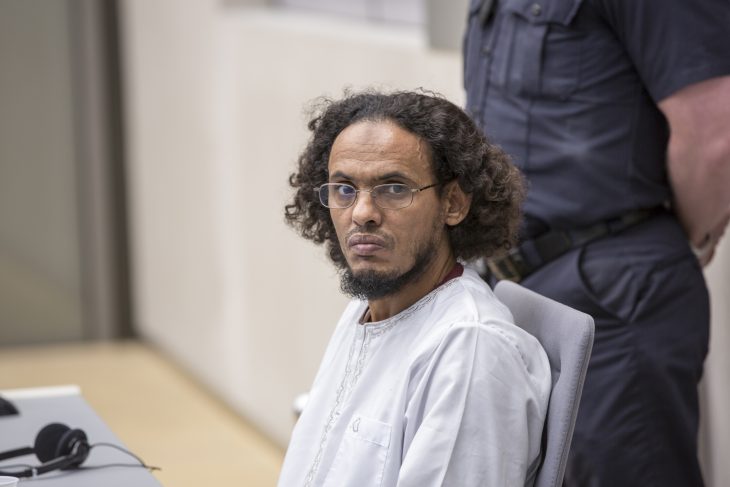The transitional justice week was marked by confirmation of charges hearings at the International Criminal Court for Ahmad Al Faqi Al Mahdi, a Malian Islamist suspected of ordering and participating in destruction of mausoleums in Timbuktu in 2012. These hearings were to determine if there is enough evidence to refer the suspect to trial.
Prosecutor Fatou Bensouda argued that Al Mahdi should be tried for war crimes for attacks on Muslim monuments important to the cultural identity of many Malians. “Humanity’s collective conscience was shocked by the senseless destruction of its common heritage,” she told the judges, urging them to act.
This hearing represents a first for the ICC, as Studio Tamani and JusticeInfo thus explained: “This is the first time in the history of international criminal justice that the destruction of religious buildings and historic monuments has been classified as a war crime. This case is also the first one the ICC has opened as part of its investigations into the 2012-2013 violence in Mali.”
Al Mahdi, thought to be about 40, was born some 100 kilometres west of Timbuktu in northern Mali. He was active during the occupation of the town and was a member of Ansar Dine, a radical Islamist group linked to Al Qaida in the Islamic Maghreb (AQMI). According to the Prosecutor, until September 2012 he headed the “Hisbah”, the “morality brigade” that operated in Timbuktu from May 2012, and was also involved with the work of the Islamic Tribunal in the town.
This hearing was much awaited by human rights activists in Mali, who want the charges against the suspect extended to include sexual violence, and hope that Mali will try Al Mahdi’s suspected accomplices itself. “We know that in the hierarchy of the armed groups this man, also known as Abou Tourab, was responsible for implementing the decisions of the Islamic Tribunal,” lawyer Moctar Mariko, who heads the Malian Human Rights Association (AMDH), told Studio Tamani. “Given that fact, we would really have liked that the Court extend the charges to sexual violence and other crimes that he may have committed in Timbuktu.”
Moctar Mariko also slammed the Malian authorities’ liberation of suspected accomplices of Al Mahdi, saying they now pose a threat to victims, witnesses and human rights defenders. He thinks Mali’s judicial authorities must also play their role fully by trying all the other suspects.
The ICC judges have 60 days to decide if Al Mahdi will be referred for trial. It was Mali that requested he be tried by the ICC.
In Côte d’Ivoire, on the other hand, transitional justice took a step back with the naturalization of Burkina Faso’s former president Blaise Compaoré and his brother. The two took refuge in Côte d’Ivoire after years of absolute power.
This presidential measure, dated November 2014 but announced this year, effectively protects the Compaoré brothers from the judicial authorities of their country, since Côte d’Ivoire does not extradite its citizens. The paradox is that Côte d’Ivoire sent its own former president Laurent Gbagbo and one of his ministers, Charles Blé Goudé, to the ICC, where their trial has just started. It seems transitional justice can also be opportunist.
In Tunisia, the President of the country’s Truth and Dignity Commission defended her work in an interview with JusticeInfo. “The locomotive of transitional justice is moving forward,” said Sihem Bensedrine. “It is moving, and it is on track. We only ask that we can be left to work in peace!”
Finally, as the trial of 95-year-old former Auschwitz nurse Hubert Zafke is due to start before a German court on March 14, JusticeInfo opens the debate on the imprescriptibility of crimes against humanity.






